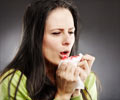Infants with whooping cough were most likely infected by the people they live with, according to a multi-country study led by researchers.
Infants with whooping cough were most likely infected by the people they live with, according to a multi-country study led by researchers from the University of North Carolina at Chapel Hill School of Public Health.
The study found that parents were the source of pertussis, commonly known as whooping cough, in 55 percent of infants. In all, household members including siblings, aunts and uncles, cousins and grandparents were responsible for 75 percent of pertussis cases among infants for whom a source could be identified.Pertussis is a highly contagious bacterial infection. Although pertussis vaccination has reduced the number of reported cases in industrialized countries by more than 95 percent from what it was in the 1950s, the number of reported pertussis cases in the United States has tripled in the past two decades.
“It is important to understand how the disease is spread, particularly to infants who are too young to be vaccinated themselves, so that steps can be taken to prevent infections in these vulnerable infants and potentially save lives,” said Dr. Annelies Van Rie, assistant professor of epidemiology in the UNC School of Public Health and the study’s senior author.
“It is troubling to learn that infants are often infected with pertussis by their own family members, who are often unaware of having pertussis themselves, and in whom pertussis could have been prevented if they had received a pertussis booster vaccination,” she said.
The study, funded by grants from the Institut Pasteur Foundation, Sanofi Pasteur and Sanofi Pasteur-MSD, was conducted over a 20-month period in four countries – Canada, France, Germany and the United States. The researchers found that among infants with pertussis for whom the source case could be identified, parents were the primary source of pertussis in infants, followed by siblings (16 percent), aunts/uncles (10 percent), friends/cousins (10 percent), grandparents (6 percent) and part-time caregivers (2 percent).
“Ongoing research, such as this study, demonstrates that adolescents and adults can transmit pertussis to infants,” Van Rie said. "Pertussis immunization of adolescents and adults, especially those in contact with young infants would not only protect themselves form pertussis, but would also protect young infants from pertussis and could save lives.”
Advertisement
The disease is spread though airborne droplets that are transmitted when an infected person coughs or sneezes. It may start as a mild cold or dry cough that persists and eventually worsens. The infected person may look and feel healthy between episodes of coughing. If left untreated, people infected with pertussis can spread the disease for several weeks.
Advertisement
Source-Newswise
SRM








